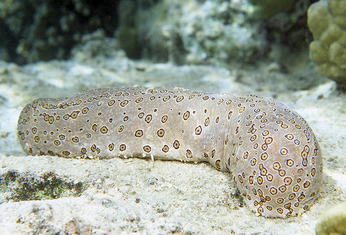 There not for eating, cooking, or scaring cats with. They are strange alien like creatures on the ocean floor! They have some unique features too,that make them extremely different from any other organism. Here is some information about this tubular cucumber: Their scientific name is Holothuroidea and they are in the echinoderm family. They're related to starfish and sea urchins. You can recognize them by there soft leathery skin. They grow from 4-12 inches long. They remind me of ocean caterpillars because their bodies are made of collagen that lets them make their body tight and loose. Many sea cucs live in shallow water on the ocean floor, while others live in the deep ocean. They can be found all over the world! Sea cucumbers are look very peculiar when they eat because they have little tube like tentacles that allow them to digest tiny particles like algae and small marine animals. They break down their food into smaller pieces and then it becomes food for other animals. They are recycling everything back into the ocean! Now thats a green cucumber! The life cycle of these bizarre oceans vegetables begins as eggs. Which soon become larvae for seventy days until they turn into small sea cucumbers. After four long years they become adults and will live for eight more years after that. That is their metamorphosis. I love these marine animals because they have the coolest adaptions that allow them to survive in the oceans. Sea cucs have respiratory trees unlike any other echinoderm. They breathe through arse, and expand and contract their bodies slowly, which brings in the water and shoots it back out. Quite peculiar but impressive. Sea cucumbers have an interesting form of self defense. When they are in danger they will discharge sticky threads to catch their enemies. They will contract their bodies and jet out some of their internal organs. Don't worry, it will all grow back! Others can even contort their bodies to defend themselves. Sea cucumber know how to take care of themselves! Here are some cool facts that I found: 1) Sea cucumbers don't have a brain but a complex nervous system. 2) Sea cucumbers don't have sensory organs, so they can only rely on instinct. 3) Some sea cucs allow tiny fish to enter and leave the arse. 4) Sea cucumbers don't use sound to communicate but they send messages using hormones. 5) Over 1250 species have been classified! Now that we all now a bit more about the sea cucumber we can learn from them and spread the message. Even though they are a bit different and even a bit weird they still deserve to be protected. And who knows, maybe they could help us too? For our oceans, sharks, and, sea cucumbers. Thank you.
0 Comments
Leave a Reply. |

Maddie Cranston,
--Ocean Warrior "We never know the worth of water till the well is dry." ~Thomas Fuller, Gnomologia, 1732 Archives
April 2018
Categories
All
|
 RSS Feed
RSS Feed
